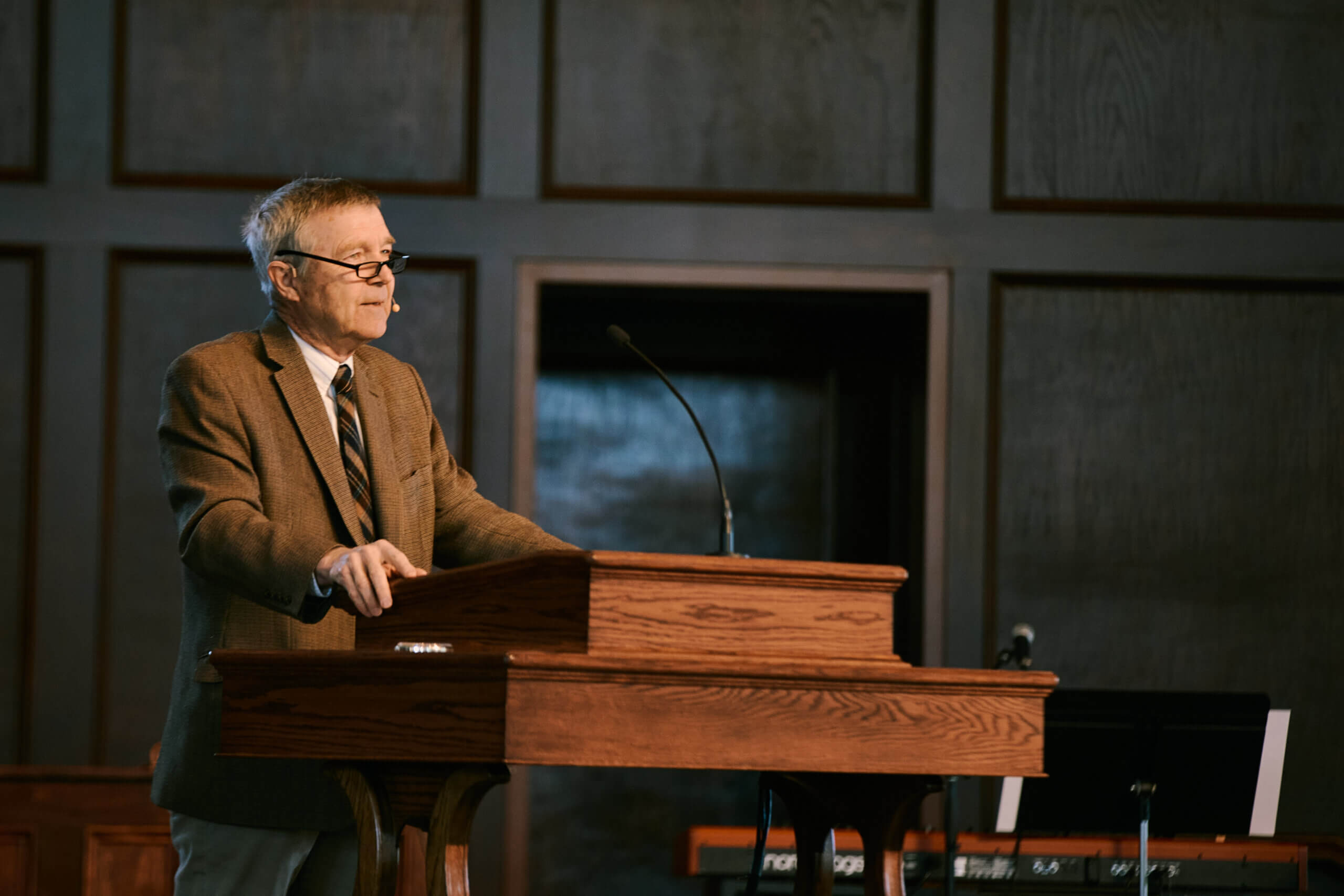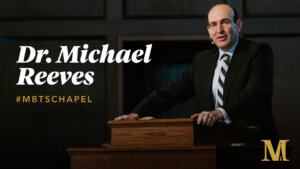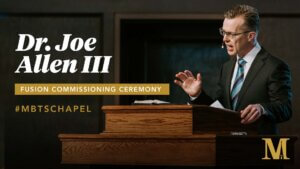Midwestern Seminary hosted theologian and seminary professor Robert Yarbrough for the annual Sizemore Lectures on March 7-8.
“It was a great joy to welcome Dr. Bob Yarbrough to our campus to deliver our annual Sizemore Lectures,” said President Jason Allen. “Dr. Yarbrough’s scholarship speaks for itself, and I am thankful our students were able to learn from him these past two days.”
During the two-day lecture series, Yarbrough focused on the topic “Just Jesus: Taking His Full Measure” in which he sought to “unite academics and doxology” as he considered the person of Jesus Christ.
In his opening lecture, Yarbrough recalled the best selling book, Gentle and Lowly, by Pastor Dane Ortlund as the inspiration for his lecture series. Following a brief reflection on the book, he explained his desire to provide a supplementary proposition for how to understand Jesus. Whereas “Ortlund highlighted Jesus as gentle” Yarbrough sought to highlight Jesus as “just” based on 1 John 2:1 which states, “But if anyone does sin, we have an advocate with the Father, Jesus Christ the righteous.”
Following his introduction, Yarbrough addressed the question, “Why is it so difficult to arrive at an agreed on conclusion of just who Jesus was?” He then recounted the diverse and contrasting portraits of Jesus across academia, public discussion, and even within like-minded confessional communities.
In response to the question, Yarbrough outlined his approach to the answer. He explained there are “three domains in which understandings of Jesus are virulent and potent for shaping how large swaths of people view Jesus at any given time.” He continued that each domain has positive results, but that the negatives of each outweigh the positives in two domains and the third domain is “under accessed by the other two.”
The first domain, Yarbrough explained, is the disputed Western academic Jesus.
Though there has been an explosion of orthodox Christian resources on Jesus that align with Scripture, Yarbrough highlighted several academic publications that have questioned or undermined the truth of who Jesus is in recent years.
He stated, “In the wider academic world, Jesus is not the divine human savior of historic Christian confession.”
“Mainstream biblical scholarship regards as normative working hypotheses that Jesus is not the salvific figure presented by New Testament writings. He is just the most revered human of a social movement associated with his name,” he said.
He continued, “For most of church history, the Bible’s verdict was affirmed, that sinners are lost and need to find salvation in Christ. We are lost, not Jesus. How did the view arise that Jesus is the one who is lost?”
Yarbrough said, “We in the West need to own up to the damage done to the Christian witness in the world and to trust in the Bible because of the European and North American assault on his memory and Lordship which has made him a disputed figure rather than the Savior to worship and serve.”
To summarize the first domain, the negative effect of the disputed Western academic Jesus has coincided with the decline of western churches and lower percentages of Americans identifying as Christians.
The second domain is the diluted North American churchianity Jesus.
According to Yarbrough, two generalizd statements can be made about the view of Jesus in North American churches.
“Number one, there are signs of vitality (in churches) and number two, a large percentage of people on church membership rolls do not reflect a sufficient knowledge of or commitment to Jesus.”
After highlighting a number of healthy denominations, churches, and resources that are offering sound answers to the question of Jesus’ identity, Yarbrough argued that “not all is well in Zion and we should not be at ease.”
He defined churchianity as “the beliefs and actions of people with some claim to Christian identity, but who lack a personal presence of the true Risen Jesus Christ in their lives.”
“This may describe half or more of the Christians on church membership rolls in the US since typically that many or more are truant from services and other church involvement most Sundays of the year.”
“Like how the academic disputes Jesus, churchianity dilutes Jesus,” he said.
The third and final domain is Jesus to the martyrs.
“What do we make of the number of fellow Christians who forfeit their life for their Lord day by day?”
Yarbrough argued that “the knowledge of Jesus among this group is rich. Today’s torrent of martyr’s blood makes the dithering impasses of academicians seem callous and willfully oblivious to the wider world. It makes the vein appeal to Jesus’ name in churchianity seem cheap and scandalous.”
After explaining each domain, Yarbrough concluded his first lecture with the phrase “Just Jesus” as a reminder of the more direct focus of his upcoming second lecture.
In his second lecture, Yarbrough sought to “round out the poignant picture of an empathetic Savior by viewing Jesus from other angles (compared to gentle and lowly as described in Ortlund’s book).”
First, he called on Ortlund’s work and Scripture to “remind us of the complex fabric that constitutes Jesus’ gentleness.”
For the Corinthian church, they learned that “Jesus being gentle and lowly, in apostolic embodiment, may necessarily and redemptively translate into being confrontational and condemning.” The full measure of Jesus, according to Yarbrough, is supplemented by qualities like “stern and exalted, zealous and adamant, regal and unyielding, and true and just.”
He continued in this portion of his lecture to describe a concerning spiritual climate in the western church that is full of “spiritual lethargy, moral laxity, and reckless disregard for Jesus in his role as ‘divine judge’ which warrants a more robust view of Jesus.”
Then, Yarbrough provided a fuller picture of Jesus’ gentleness by offering three considerations that add to Ortlund’s vision of Jesus as gentle and lowly.
1. Joltin’ Jesus
Much like baseball hall of fame player, Joe DiMaggio, who had a “potent bat” and was called “Joltin’ Joe,” “Jesus came across not only as gentle, but also jolting.”
Yarbrough went on to describe how Jesus, in his gentleness, also stood as the judge in the writings of Paul to the Corinthians and by the author of the book of Hebrews. “Jesus threw a lot of sharp elbows,” he said.
Much like Ortlund wrote in his book, Yarbrough emphasized Jesus as a “lamb to the pentitent and lion to the impenitent” who could be jolting in his response to sin.
2. Jesus according to John on Patmos
In the book of Revelation, “John provides authoratitive witness to Jesus as gentle and just,” according to Yarbrough. He highlighted the demeanor and actions of Jesus when He addressed the seven churches in Revelation chapters 1 through 3.
“Even if we grant that these are healing words of redemptive direction due to their source, Christ the Savior, they hardly sound gentle. Jesus the lamb is also, as Ortlund has it, the lion,” he said.
3. Just Jesus’ Force of Character
In his final consideration, Yarbrough squared the gentle nature of Jesus with His redemptive work which makes Jesus’ gentleness possible.
“Jesus performs the work that makes it possible for him to be gentle towards sinners. He paid for our sins with His blood. He absorbed God’s wrath for our sin by offering the perfect sacrifice for sin.”
He continued, “He was, in the words of another Jerusalem pastoral pillar (Peter in 1 Peter 3:18), the ‘just dying for the unjust.’”
“Therefore, just Jesus can be gentle Jesus for he has born our sins to be remembered against us no more.”
As Yarbrough concluded the Sizemore Lectures, he said, “It has been my aim to augment Gentle and Lowly’s message with this—that cleansing is potent. Just Jesus not only forgives, but equally fortifies.”
The Sizemore Lecture series was established in 1978 in memory of Dr. Burlan A. Sizemore, Jr., professor of Old Testament and Hebrew at Midwestern Seminary from 1968-1976. This annual lecture series brings noted biblical scholars to Midwestern Seminary’s campus as a way of continuing Sizemore’s legacy of theological and biblical commitment.
Dr. Robert Yarbrough teaches Greek and New Testament at Covenant Theological Seminary in Saint Louis, Missouri. He is the author, co-author, editor, or translator of numerous books and articles. In addition to teaching throughout the United States, he has taught in eastern Europe, Sudan, South Africa, Hong Kong, Australia, Haiti, and elsewhere. Dr. Yarbrough earned a PhD from the University of Aberdeen in Scotland.
To listen to the lectures, click here.
To learn more and read Dr. Robert Yarbrough’s works, click here.


